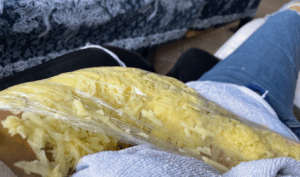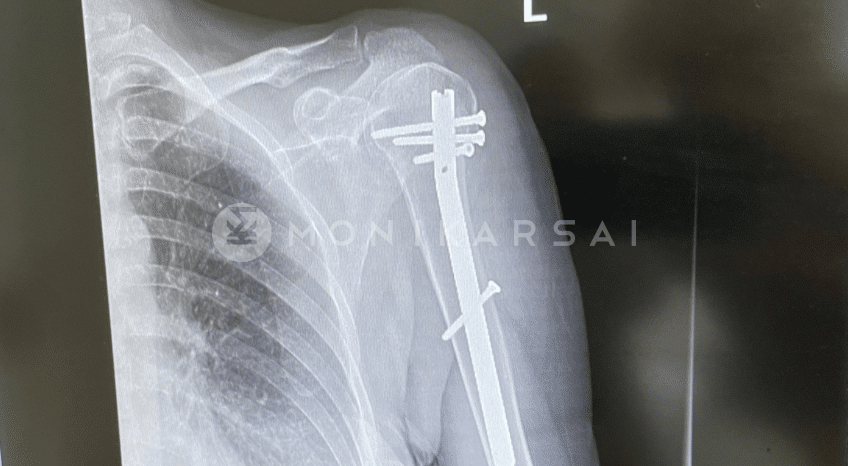
Upon leaving the hospital and five days later: No swelling, but bruises are still present

Two and a half months after shoulder surgery
The Most Important Steps After a Fresh Injury
1. Assess the condition
- In case of loss of consciousness, severe bleeding, or intense pain, call an ambulance immediately!
- If the injured limb is in an unnatural position, do not try to realign it! Instead, immobilize it and seek medical attention.

Fract.-colli-chir.-humeri-sin.op_.-HWX-szegezés- Fract.-colli-chir.-humeri-sin.op_.-HWX-szegezés-Fracture of the proximal end of the humerus.
2. Immediate Care
- Rest, relieve pressure, immobilization – Stabilizing the injured area helps prevent further damage.
- A cold compress or ice pack – Reduces swelling and pain.
- Compression bandage – Used in cases of severe bleeding.
- Elevation – Helps reduce swelling and improves circulation.

Fresh grated potato compression for reducing inflammation
When Should You See a Doctor?
- Persistent, intense pain or inability to move the affected limb.
- Open fractures or severe swelling.
- Numbness, loss of sensation, or signs of circulatory disorders (cold, pale limb).
- Bleeding that does not stop after 10 minutes.
- Head injury, loss of consciousness, or confusion.
- It is always better to consult a doctor if unsure, as untreated injuries can have long-term consequences!

Lightweight plaster cast for wrist fracture, finger mobilization
The First Period of Recovery
The first few weeks after an injury are the key to recovery. The body needs proper rest, care, and the best possible conditions to start healing.
Pain and helplessness are the biggest challenges. While a quick medical diagnosis and proper treatment are essential, the patient’s role is just as important—we need to understand how much we can do for our own recovery.
- Effective communication with your doctor is key. – Don’t hesitate to ask about your injury, expected recovery time, and potential complications. Understanding these aspects can give you a sense of control over your recovery process.
- Rest and sleep—Proper sleep and the correct lying position promote regeneration. Do not put pressure on the injured body part! Rest as much as possible and, if possible, keep it elevated to reduce swelling.
- Healing is in our hands –Doctors can help, but for proper regeneration, we must also be active: exercise, eat right, rest, and pay attention to our body’s signals.
- Mental strength is just as important as physical strength. Injuries are also psychological challenges that require patience, self-discipline, and a positive mindset.

Swelling in the fingers after a wrist fracture
Natural and Home Remedies for Faster Recovery
Nutrition and Supplements
- Collagen and protein help tissue regeneration.
- Vitamins, minerals, and supplements to reduce inflammation and support the body.
- Anti-inflammatory diet and nutritional supplements.

Herbal creams for bruises, pain relief, and improving blood circulation
Movement and Physical Therapy
- Perform light movements as a doctor advises to prevent muscle stiffening and improve circulation.
- During rehabilitation, you can gradually strengthen the injured area.
- Perform physiotherapy several times a day, following the advice of specialists.
- Gradually put weight on the injured limb—avoid overexertion but stay as active as possible.
- Self-massage, couple massage, and therapeutic massage can help reduce pain and support muscle regeneration.
- Thai foot massage or reflexology helps activate homeostasis (the body’s self-healing ability) and promotes faster recovery through reflexive effects.

Daily at-home foot massage has been very helpful
Other Natural Therapies and Regenerative Methods
- Anti-inflammatory and muscle-relaxing essential oils.
- Homeopathic preparations.
- Bone-strengthening supplements.
- Various medicinal herbs support the body.
- While the affected area is still swollen and warm, we can use other wraps in addition to ice gel packs (I found raw grated potato compress particularly effective).
- Herbal creams for pain relief, bruising, or circulation stimulation.

My favorite supplement, homeopathic remedy, and pain-relieving stick
Protecting Our Mental Well-being
- Accept what happened and focus on healing.
- Journaling can help track recovery and focus on positive changes.
- Consulting qualified psychologist.
- Kinesiology.
- Meditation, chakra meditation.
- Visualization techniques.



